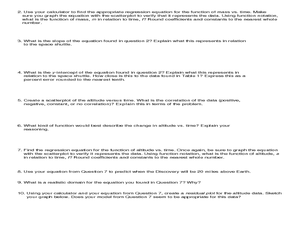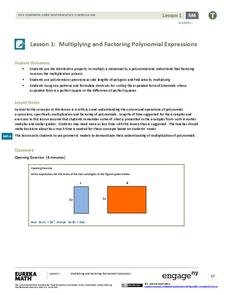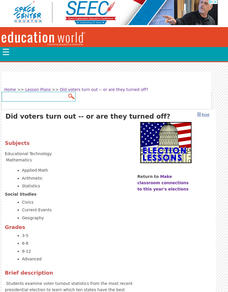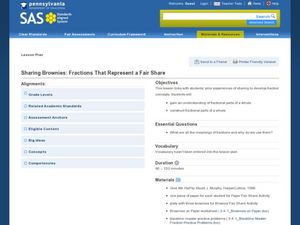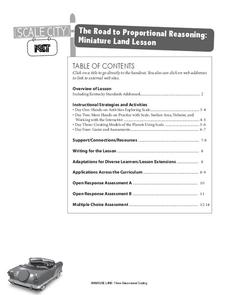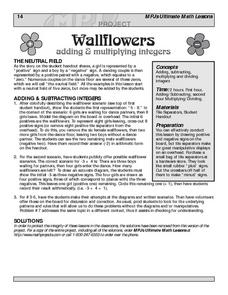Curated OER
Multiplication
Learners practice their multiplication facts by reinforcement and repetition. Students write facts in their math journals, and use labeled soccer ball and deck of cards to practice multiplying by "number of the day." Play continues until...
Curated OER
Red Circle, Red Circle, What Do You See?
Young learners explore shapes and colors. They listen to Brown Bear, Brown Bear What Do You See? by Bill Martin Jr. and use the same language pattern to create a color and shape book of their own. After that, with the leftover magazine...
Curated OER
Reading Graphs
Working independently or in teams, your class practices connecting graphs, formulas and words. This instructional activity includes a guided discussion about distance vs. time graphs and looking at how velocity changes over time.
Ohio Department of Education
The Solution is Complex
Consider complex numbers, roots, and quadratic equations. Use the discriminate as a way to determine the nature of a quadratic's roots. Then discuss the similarities and differences between quadratics with two, one, or no real roots....
Curated OER
Linear and Quadratic Model, Data Modeling
Students model quadratic and linear equations. In this algebra lesson, students solve word problems using equations. They create scatter plots and make predictions using correlations.
Curated OER
Exploring Expressions
Examine parts of an expression in this algebra lesson. Ninth graders identify the properties of the coefficient and their behavior to the graph. They graph the equation on a TI to see their results.
EngageNY
Multiplying and Factoring Polynomial Expressions (part 1)
Polynomial multiplication and factoring go hand in hand. Why not teach them together. This resource begins with an area model for distributing a monomial and then connects the process to factoring the GCF. Learners then advance to...
Curated OER
Did Voters Turn Out -- or Are They Turned Off?
What was the voter turnout at your last state election? Examine voter turnout statistics from the most recent election to learn which ten states have the best turnout record. This lesson offers election data, handouts, and worksheets.
Alabama Learning Exchange
Introduction to Division
Examine how addition, subtraction, multiplication, and division relate to and are separate from each other. As they listen to the book, The Doorbell Rang, they demonstrate the math described in the story by cutting up paper cookies...
Curated OER
Sippin' on Smoothies
Why is calcium good for the body? Where is it stored? Young chefs discover the importance of calcium and review a list of foods that are rich in the material. They then make delicious smoothies high in calcium! Teaching kids how to...
Curated OER
Cutting Corners - Parts 1 and 2
Students use optimization concepts to design their own container. In this optimization lesson plan, students understand how the optimization concept is critical in calculus and why products are packaged the way they are.
Visa
Making Spending Decisions
By role playing real-world experiences, such as purchasing snacks and grocery/toy store shopping, your youngsters will begin to develop an understanding of how to make decisions and choose between alternatives. This is the first...
Curated OER
Sharing Brownies: Fractions That Represent a Fair Share
Elementary graders discover the concept of fractional pieces of a whole. They investigate the meanings of fractions in everyday life and why they are used. Pupils divide brownies amongst each other to demonstrate the use of fractions...
Curated OER
Investigation - Staci's New Car
Students study a shopping problem. They discuss strategies for determining the number of possible choices. They create a tree diagram and an organized list. Students analyze patterns and derive an equation for the multiplication principle.
Curated OER
Powers and Roots of Complex Numbers
Explore a few powers of complex numbers numerically and decide if there is a pattern and use parametric equations to represent a complex number graphically. Use De Moivre's theorem to represent the roots of the complex number...
Curated OER
Dot Plots
Number crunching statisticians explore displaying data with dot plots and define the difference between quantitative data and qualitative data. Dot plots are created based on a set of given data and analyzed.
Curated OER
Does Your Field Measure Up
Young scholars measure angles using a plane table kit. In this geometry lesson, students use trigonometric identities to find the values of the length of a football field.
Utah Education Network (UEN)
Geo Shapes
Invite your first graders to compose and decompose two and three-dimensional figures with this fun, hands-on lesson. They investigate and predict the results of putting together and taking apart two-dimensional shapes with rubber bands...
Kentucky Educational Television
The Road to Proportional Reasoning
Just how big would it really be? Young mathematicians determine if different toys are proportional and if their scale is accurate. They solve problems relating scale along with volume and surface area using manipulatives. The...
Curated OER
Chemistry Day With Glitter Wands
First graders observe examples of the three states of matter and identify matter in each of the three states. They make glitter wands to remind them of the three states of matter: solid, liquid and gas. Pupils brainstorm and record...
Curated OER
Wallflowers: Adding and Multiplying Integers
Students solve word problems in which they add, subtract, multiply, and/or divide integers, identify rules and patterns for multiplying and dividing integers, create scenarios that represent each expression, and evaluate expressions.
Pennsylvania Department of Education
Using Polygons to Represent Fractions
Explore the world of fractions by using pattern blocks to show how different shapes can divide a hexagon. Elementary schoolers work in groups to complete these problems and to answer questions. Later, they work complete an independent...
Curated OER
Influence and Outliers
Using the TI-Nspire calculator, statisicians identify outliers and their effect on the least-squares regression line. In finding the line of best fit, they determine what points will affect the least squares regressions and what points...
Curated OER
Monster Frog Function Machine
Elementary schoolers use a function machine in order to help them look at the relationship between input and output, and to look at the rule for the change. The machine is actually a cardboard box, and it serves quite well for the lesson...




